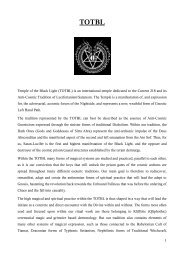Satanism Today - An Encyclopedia of Religion, Folklore and Popular ...
Satanism Today - An Encyclopedia of Religion, Folklore and Popular ...
Satanism Today - An Encyclopedia of Religion, Folklore and Popular ...
You also want an ePaper? Increase the reach of your titles
YUMPU automatically turns print PDFs into web optimized ePapers that Google loves.
190 Nightmares<br />
sentencing, such individuals are criminals who<br />
adopt <strong>Satanism</strong> as a way <strong>of</strong> justifying their antisocial<br />
actions.<br />
See also Crime; Heavy Metal Music<br />
For Further Reading:<br />
Baddeley, Gavin. Lucifer Rising: Sin, Devil Worship<br />
<strong>and</strong> Rock’n’Roll. London: Plexus, 1999.<br />
Carlo, Philip. The Night Stalker: The True Story <strong>of</strong><br />
America’s Most Feared Serial Killer. New York:<br />
Kensington Books, 1996.<br />
LaVey, <strong>An</strong>ton Sz<strong>and</strong>or. The Satanic Bible. New York:<br />
Avon, 1969.<br />
Lyons, Arthur. Satan Wants You: The Cult <strong>of</strong> Devil<br />
Worship in America. New York: Mysterious<br />
Press, 1988.<br />
Newton, Michael. Raising Hell: <strong>An</strong> <strong>Encyclopedia</strong> <strong>of</strong><br />
Devil Worship <strong>and</strong> Satanic Crime. New York:<br />
Avon, 1993.<br />
Nightmares<br />
Other dreams are evil, sent by the Devil, <strong>and</strong> <strong>of</strong>ten<br />
show obscene images, <strong>and</strong> some stir up the humors <strong>of</strong><br />
the body <strong>and</strong> provoke sensual movement, against<br />
which the Church sings: “Remove dreams <strong>and</strong><br />
nocturnal phantasies from me, <strong>and</strong> restrain our<br />
enemy so that our bodies will not be sullied.”<br />
—Father Gracian, confessor <strong>of</strong> St. Theresa<br />
All cultures <strong>and</strong> all time periods report nightmares.<br />
Given the widespread belief in demons<br />
before the contemporary period, it is only natural<br />
that the common experience <strong>of</strong> nightmares<br />
would <strong>of</strong>ten be explained in terms <strong>of</strong> the intrusion<br />
<strong>of</strong> demonic forces. This explanation is so<br />
widespread, in fact, that it is not unusual to find<br />
special prayers <strong>and</strong> ceremonies intended to<br />
protect the sleeper from evil entities. Despite the<br />
many revelatory dreams recorded in the Bible, the<br />
Christian tradition has generally taken a negative<br />
attitude toward dreaming. Some medieval<br />
churchmen went so far as to denounce all dreams<br />
as creations <strong>of</strong> the Devil. Speculation on the<br />
demonic status <strong>of</strong> nightmares with Christianity<br />
goes back to the church fathers.<br />
Tertullian was a third century lawyer-turnedpriest<br />
who was the first significant Christian<br />
theologian to write in Latin rather than Greek.<br />
Eight chapters <strong>of</strong> his A Treatise on the Soul dealt<br />
with the closely related phenomena <strong>of</strong> sleep <strong>and</strong><br />
dreams. Tertullian felt that the ongoing activity<br />
<strong>of</strong> the mind in dreams while the body was<br />
motionless in sleep proved that the soul was<br />
independent <strong>of</strong> the body, <strong>and</strong> thus immortal. As<br />
part <strong>of</strong> his adherence to the idea <strong>of</strong> the disjunction<br />
between the body <strong>and</strong> the soul during sleep,<br />
he discounted the idea that the condition <strong>of</strong> the<br />
body (e.g., whether one was fasting or had eaten<br />
spicy food the preceding day) influenced one’s<br />
dreams. He was also critical <strong>of</strong> the idea that the<br />
soul left the body <strong>and</strong> traveled during sleep.<br />
Tertullian also classified dreams according to<br />
their source. Although God was responsible for<br />
many dreams, so were demons. With respect to<br />
the latter, Tertullian asserted confidently that<br />
dreamers would not be held responsible for sins<br />
committed in their sleep, any more than they<br />
would receive crowns in heaven for imaginary<br />
acts <strong>of</strong> martyrdom.<br />
Macrobius was a fourth century Christian<br />
writer whose Commentary on the Dream <strong>of</strong> Scipio<br />
became the most influential dream book <strong>of</strong><br />
medieval Europe. Compared with his contemporaries,<br />
Macrobius was negative <strong>and</strong> superstitious.<br />
Clearly indebted to the Oneirocritica, the dreambook<br />
<strong>of</strong> the great pagan dream interpreter<br />
Artemidorus, Macrobius added material on<br />
apparitions <strong>and</strong> nightmares—topics not explicitly<br />
covered by Artemidorus. Macrobius also<br />
included a discussion <strong>of</strong> incubi <strong>and</strong> succubi, the<br />
sexual demons who seduced virtuous men <strong>and</strong><br />
women in their sleep, <strong>and</strong> who became highly<br />
popular creatures in medieval European<br />
demonological lore. Although these beings are<br />
rooted in earlier Jewish folklore, Macrobius<br />
appears to have been the person to introduce<br />
them into Christianity.<br />
Of particular importance for the Middle Ages<br />
was St. Jerome’s mistranslation <strong>of</strong> certain key<br />
biblical passages that, in the original, read something<br />
along the lines <strong>of</strong>, “you shall not practice<br />
augury witchcraft.” In Jerome’s translation, which<br />
became authoritative, the same passage reads,<br />
“you shall not practice augury nor observe<br />
dreams.” These explicit condemnations, in combination<br />
with the admonitions <strong>of</strong> writers like<br />
Macrobius who warned against the attacks <strong>of</strong><br />
demons in one’s sleep, served effectively to<br />
condemn dreams as little more than stages for
















